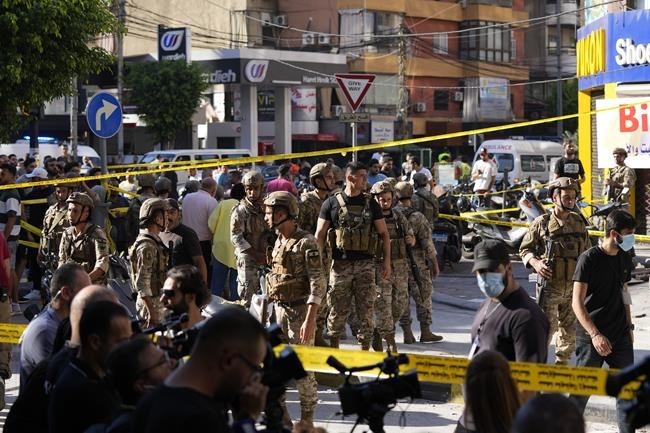
Lebanese soldiers cordon off the area at the site of an Israeli airstrike in Beirut's southern suburbs, Thursday, Sept. 26, 2024. (AP Photo/Hassan Ammar)
September 26, 2024 - 12:36 PM
BEIRUT (AP) — In 2006, after a bruising monthlong war between Israel and Lebanon's powerful Hezbollah militant group, the United Nations Security Council unanimously voted for a resolution to end the conflict and pave the way for lasting security along the border.
But while there was relative calm for nearly two decades, Resolution 1701's terms were never fully enforced.
And now, after nearly a year of low-level clashes, Israel and Hezbollah appear on the verge of another all-out war. As Israeli jets pound deep inside Lebanon and Hezbollah fires rockets deeper into northern Israel, U.N. and diplomatic officials have again turned to the 2006 resolution in a bid to end the conflict.
Years of deeply divided politics and regionwide geopolitical hostilities have halted substantial progress on its implementation, yet Resolution 1701 is still considered the brightest prospect for long-term stability between Israel and Lebanon.
What is UNSC Resolution 1701?
In 2000, Israel withdrew its forces from most of southern Lebanon along a U.N.-demarcated “Blue Line” that separated the two countries and the annexed Golan Heights. U.N. peacekeeping forces in Lebanon, known as UNIFIL, increased their presence along the line of withdrawal.
Resolution 1701 was supposed to finish the incomplete work from 2000 and end the 2006 war; Israeli forces would fully withdraw while the Lebanese army and UNIFIL — Hezbollah excluded — would be the exclusive armed presence south of Lebanon's Litani River.
The Lebanese state was to have full sovereignty over its south.
Meanwhile, up to 15,000 U.N. peacekeepers would help to maintain calm, return displaced Lebanese and secure the area alongside the Lebanese military.
The goal was long-term security, with land borders eventually demarcated to resolve territorial disputes.
“It was made for a certain situation and context,” Elias Hanna, a retired Lebanese army general, told The Associated Press. “But as time goes on, the essence of the resolution begins to hollow.”
Has it been implemented?
For years, Lebanon and Israel blamed each other for countless violations along the tense frontier. Israel says Hezbollah’s elite Radwan Force and growing arsenal remain, and accuses the group of using a local environmental organization to spy on troops. Lebanon complains about military jets and naval ships entering Lebanese territory even when there is no active conflict.
“You had a role of the UNIFIL that slowly eroded like any other peacekeeping with time that has no clear mandate,” said Joseph Bahout, the director of the Issam Fares Institute for Public Policy at the American University of Beirut. “They don’t have permission to inspect the area without coordinating with the Lebanese army.”
UNIFIL for years has urged Israel to withdraw from some territory north of the frontier, but to no avail.
Hezbollah’s power has meanwhile grown, both in its arsenal and as a political influence in parliament.
The Iran-backed group was essential in keeping Syrian President Bashar Assad in power when armed opposition groups tried to topple him, and it supports Iran-backed groups in Iraq and Yemen. It has an estimated 150,000 rockets and missiles, including precision-guided missiles pointed at Israel, and has introduced drones into its arsenal.
Hanna says Hezbollah “is something never seen before as a non-state actor" with political and military influence.
How relevant is 1701 to ending the current hostilities?
Efforts led by the U.S. and France for a temporary ceasefire between Israel and Hezbollah have underscored that they still view the resolution as key. For almost a year, Washington has promoted various versions of a deal that would gradually lead to its full implementation.
But the circumstances now are far more complicated than in 2006.
Israel says its aerial bombardments aim to push Hezbollah back and allow its northern residents to return home safely. Hezbollah says it will stop firing rockets only once there is a ceasefire in the Gaza Strip, where Israel continues to battle Hezbollah's key ally Hamas. Negotiations for a ceasefire there are gridlocked.
“You’re tying 1701 with a hundred things,” Bahout said. “A resolution is the reflection of a balance of power and political context.”
So while the Security Council resolution’s goals are still relevant, new issues have emerged that have sidelined its implementation.
“Between the warring parties, you have to make each party feel that they achieved something,” Hanna said. “Otherwise, you won’t come to the table unless you are defeated or annihilated.”
News from © The Associated Press, 2024